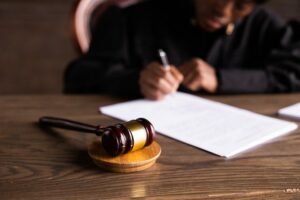After reading the the QLS Admission Kit, if you are still unsure, then most likely you need personalized help. If you have nothing to disclose according to the kit then provably this blog post is not for you.
Preparing a disclosure statement for admission as a solicitor can be one of the most difficult task for a potential lawyer. Usually, no one likes to talk about it or share their experience. I do not support that. I value all the mistakes I have done in my life because those gave me super valuable lessons. Most likely, I have been through almost all the obstacles anyone can go through.
I have applied and have been refused my application for Early Consideration of Suitability. I have managed to set aside a decade-old judgment, have instructed a senior solicitor, provided 300 pages of an affidavit and was lucky to have a Senior Counsel prepare a submission within 24 hours (5 days before the admission session).
I will share my experience, if you need any help, feel free to Contact Me.
Top Tip
Do you want to know what happens in Admission Settings?
1. Find the admission setting dates Here
2. Go to the daily law list of that day of that Supreme Court Here
if you are in Brisbane – Here
You can find the YouTube link to view the admission settings and watch the last session. Usually at that session, the court deals with the applications where an oral submission is required or there are concern by the court on an application.
Preparing Disclosure statement
There is a lot of content on QLS site that provides guidance on preparing disclosure statements. If you are still unsure, then most likely you need personalized help. I would suggest to opinion from someone who is super skeptical and does not know you. I think these 3 questions should be answered in your statement
- Does your writing gives an absolutely clear picture of what happened?
- Does it also clearly show what you feel about that event?
It should show that you take responsibility and you feel proper remorse and you learned a lesson and that lesson stopped you from recreating a similar event. - How much you have changed after that event and how that changes happened?
For example, you worked with a senior solicitor for a considerable period.
Sometimes, you think that you have given a clear picture, but the majority of the time it may not be the case.
Preparing Affidavit for Admission
Preparing an affidavit is not an easy task. QLS Admission Kit provides good guidance. Make sure you have included everything in Form 7. It would be very good if you can find someone who wishes to share their affidavit. Even if you have nothing to disclose, you should have at least about 12 exhibits. Court do not like hearsay evidence. Whatever facts you are putting forward, you should include evidence. For example, if you say you had allegation of academic misconduct, must include the original work and initial communication from your university.
Submission for Admission
The board might require you to file a submission to support your application that despite all the matters you have disclosed, you are a fit and proper person to be admitted. This is usually referred to as a Qualified Certificate of Recommendation. You get about 24 hours from when the board informs you about this requirement to file the submission. So for example, the board might inform you on Tuesday at about 10 am that you need to file the submission by Thursday 10 am.
My suggestion would be If you have any matter to disclose, better to have that submission prepared and ready right after you have filed your affidavit. Usually, your mover should finalize the submission. It is better to have a mover who is comfortable to do so. I had to change my mover as my mover’s area of practice was not related to admission matters.
Even if board provide submission favorable to you, it does not necessarily mean that Court will not have any concern.
Adjournment of Admission
At any time before the admission ceremony, you might get a notification that your admission is adjourned. Sometimes court reads your submission and goes over your affidavit on the admission date and can decide that your admission should be adjourned for a later date. If you are listed in the last admission session, you can take that as an indication of a possibility that the court (The Supreme Court Judges) will have a good look at your materials.
If you have troubling matters, please seek help before putting forward anything to the board.
Early Suitability Consideration
According to FAQ of QLS website
Section 39 of the Legal Profession Act 2007 (‘the Act’) requires the Board to consider each application for admission and make a recommendation to the Supreme Court as to whether or not, amongst other things, an applicant is suitable for admission having regard to all suitability matters in relation to each applicant to the extent appropriate.
As part of the process to enable consideration of suitability matters, sections 32 and 33 of the Act allows applicants intending to seek admission to apply for early consideration of suitability. These provisions allow a person to apply for a declaration from the Board that the suitability matters will not, without more, adversely affect the Board’s assessment of their suitability for admission. The provisions also allow the Board to refer matters to the Supreme Court if it requires a direction, or refuse to make the declaration sought and, indeed, allows applicants to appeal the Board’s determination to the Supreme Court.
In order to make such an application, you will be required to provide the following:
- A letter requesting a declaration pursuant to section 32 of the Act;
- A sworn affidavit (not filed) detailing the circumstances relating to your suitability issues;
- Original copies of any documents relating to your suitability issues;
- A copy of any academic qualification (academic transcript) allowing eligibility for admission; and
- Three Form 8 Certificates of Suitability.
The onus is upon the applicant to satisfy the Board of his/her suitability/fitness for admission.
Naturally, it should be noted the legislative provisions dealing with applications for early consideration of suitability do not in any way detract from an applicant’s ongoing obligation to the Board, and more importantly the Supreme Court, in relation to suitability issues when applying for admission.
Refer 2007 Act Section 32, 33 and 39
This means, if you have a troubling matter which you believe can create problems in your admission process, you can disclose those matters to the admission board and ask if those can stop you from being admitted. It is also helpful as it gives you an opportunity to obtain guidance from the board on how can you overcome those challenges. Anyone can make that application, even before starting a law degree. It is free as well. If you have a serious matters, Criminal or Civil, better to make such an application.
You should consider this preparing and applying for the application for early Early Consideration of Suitability as a trial of your actual application for admission.
But keep in mind, your application will be considered in any future application. That means, if you say something in your application for suitability consideration application and you say something different in the actual application for admission, that will be taken negatively on your application for admission.









